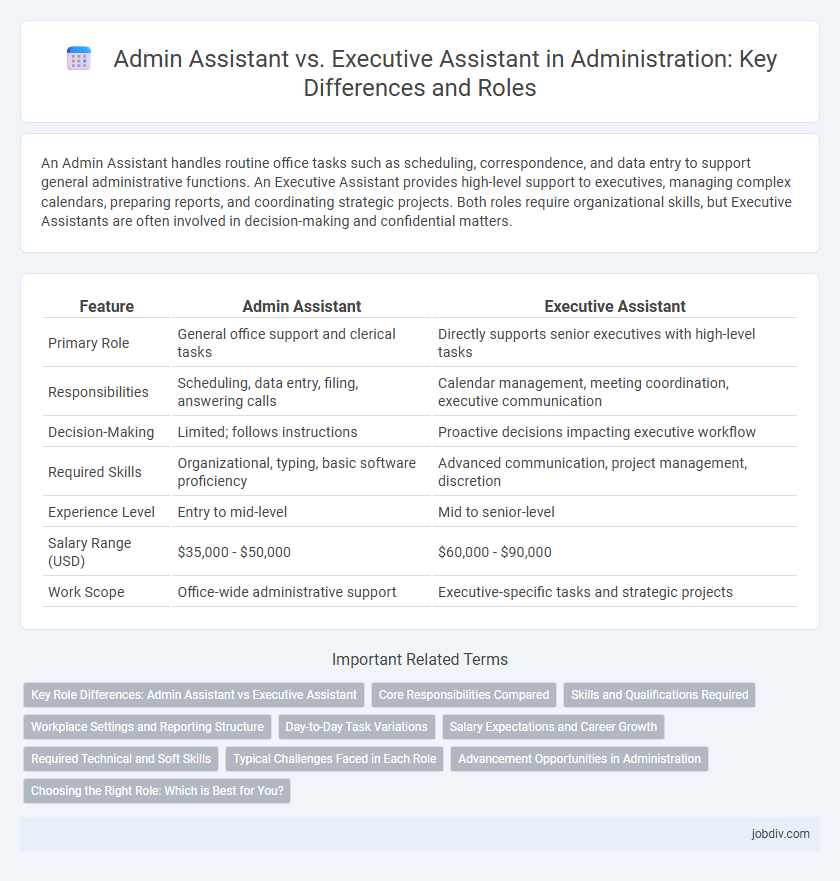An Admin Assistant handles routine office tasks such as scheduling, correspondence, and data entry to support general administrative functions. An Executive Assistant provides high-level support to executives, managing complex calendars, preparing reports, and coordinating strategic projects. Both roles require organizational skills, but Executive Assistants are often involved in decision-making and confidential matters.
Table of Comparison
| Feature | Admin Assistant | Executive Assistant |
|---|---|---|
| Primary Role | General office support and clerical tasks | Directly supports senior executives with high-level tasks |
| Responsibilities | Scheduling, data entry, filing, answering calls | Calendar management, meeting coordination, executive communication |
| Decision-Making | Limited; follows instructions | Proactive decisions impacting executive workflow |
| Required Skills | Organizational, typing, basic software proficiency | Advanced communication, project management, discretion |
| Experience Level | Entry to mid-level | Mid to senior-level |
| Salary Range (USD) | $35,000 - $50,000 | $60,000 - $90,000 |
| Work Scope | Office-wide administrative support | Executive-specific tasks and strategic projects |
Key Role Differences: Admin Assistant vs Executive Assistant
Administrative Assistants manage routine office tasks such as scheduling, correspondence, and filing to support overall organizational efficiency. Executive Assistants handle higher-level responsibilities including strategic calendar management, executive communication, and project coordination directly for top executives. The key role differences highlight Executive Assistants' involvement in decision-making processes and confidential matters, whereas Administrative Assistants primarily provide general administrative support.
Core Responsibilities Compared
Administrative Assistants manage daily office tasks such as scheduling appointments, handling correspondence, and maintaining records, focusing on supporting overall office efficiency. Executive Assistants handle higher-level responsibilities, including managing executives' calendars, preparing strategic reports, and coordinating complex projects to streamline leadership workflows. Both roles require strong organizational skills, but Executive Assistants often engage in decision-making support and confidential communication.
Skills and Qualifications Required
Administrative Assistants require strong organizational skills, proficiency in office software, and excellent communication abilities to manage scheduling, correspondence, and routine office tasks. Executive Assistants need advanced expertise in project management, strategic planning, and confidential communication, often supporting senior executives with complex calendar coordination and decision-making processes. Both roles demand adaptability, attention to detail, and a high level of professionalism, though Executive Assistants typically require more experience and specialized training in business operations.
Workplace Settings and Reporting Structure
Admin Assistants typically support a team or department within corporate or educational workplace settings, reporting to middle management or department heads. Executive Assistants work closely with C-suite executives in high-level corporate or governmental environments, often reporting directly to CEOs or senior leaders. The reporting structure for Executive Assistants involves greater autonomy and strategic involvement compared to Admin Assistants who handle more routine administrative tasks.
Day-to-Day Task Variations
Admin Assistants primarily handle routine clerical duties such as managing schedules, answering phones, and organizing files to ensure smooth office operations. Executive Assistants perform more complex tasks including preparing reports, coordinating high-level meetings, and managing executive communications, requiring a deeper understanding of business priorities. The key distinction lies in the scope of responsibility, with Executive Assistants supporting senior management and strategic initiatives, while Admin Assistants focus on general administrative support.
Salary Expectations and Career Growth
Executive Assistants typically command higher salaries than Admin Assistants due to increased responsibilities managing senior-level executives and complex schedules, with median annual earnings ranging from $60,000 to $85,000 compared to $35,000 to $50,000 for Admin Assistants. Career growth for Executive Assistants often leads to roles in executive office management, project coordination, or specialized administrative leadership, whereas Admin Assistants usually advance into more senior administrative roles or specialize in departmental support functions. Salary expectations are influenced by factors including industry, geographic location, and years of experience, with Executive Assistants positioned for greater long-term earning potential and career advancement opportunities.
Required Technical and Soft Skills
Admin Assistants require proficiency in office software like Microsoft Office and calendar management tools, along with strong organizational skills and attention to detail. Executive Assistants need advanced technical skills including project management software, data analysis tools, and the ability to handle complex communication across multiple stakeholders. Both roles demand excellent interpersonal skills, discretion, adaptability, and problem-solving capabilities to efficiently support daily operations and executive decision-making.
Typical Challenges Faced in Each Role
Admin Assistants often face challenges related to managing routine tasks, organizing schedules, and handling a high volume of correspondence while ensuring accuracy and efficiency. Executive Assistants typically encounter complex challenges such as navigating executive priorities, managing confidential information, and coordinating high-stakes meetings and strategic projects. Both roles require strong organizational skills and adaptability, but Executive Assistants must also excel in anticipatory problem-solving and decision-making under pressure.
Advancement Opportunities in Administration
Admin Assistants typically have clear advancement pathways into specialized administrative roles or office management positions, building foundational skills in organization and communication. Executive Assistants often gain exposure to strategic decision-making and high-level project coordination, positioning them for senior roles such as Executive Office Manager or Chief of Staff. Both roles benefit from continuous skill development in technology, leadership, and business operations to enhance career growth in administration.
Choosing the Right Role: Which is Best for You?
Choosing between an Admin Assistant and an Executive Assistant depends on your career goals and skill set; Admin Assistants handle routine clerical tasks such as scheduling, data entry, and correspondence, while Executive Assistants manage higher-level responsibilities like project coordination, strategic planning support, and executive communication. Executive Assistants typically require advanced organizational skills, discretion, and experience working closely with senior leadership, making this role ideal for professionals seeking greater responsibility and influence within an organization. Evaluating your strengths and desired involvement with leadership will help determine the best fit for your professional growth in administration.
Admin Assistant vs Executive Assistant Infographic

 jobdiv.com
jobdiv.com